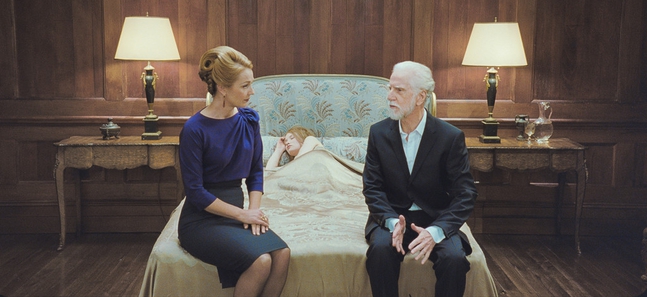Sleeping Beauty
Novelist Julia Leigh delivers an erotic, ironic spin on the fairy tale

(C) 2011 Screen Australia, Screen NSW, Spectrum Films Pty Limited,Cardy&Company Pty Ltd, Lindesay Island Pty Ltd and Magic Films Pty Ltd.
Posted: Wed Nov 02 2011
Director: Julia Leigh
Starring: Emily Browning, Rachael Blake, Ewen Leslie
Time Out rating: 
If you don’t recall the moment in the Disney version of Charles Perrault’s enduring romantic fable in which our heroine nonchalantly wanders into a research laboratory to have her gag reflex tested, that’s because it isn’t there. Jane Campion-approved Australian novelist and screenwriter Julia Leigh makes a very natural transition into the director’s chair with this languid, inquisitive and visually meticulous debut feature about erotic desire, voyeurism, the ravages of age and the commodification of flesh.
It’s a film of ideas, reminiscent of Luis Buñuel’s Belle de Jour (1967), which itself charted a woman’s sexual odyssey with a sense of hard intellectual inquiry. Both are unabashed works of feminism in which female sublimation is employed to reflect the ugly traits of male sexual longing, and Leigh’s film is also suffused with a biting strain of ironic humour.
The motif of a coquettish girl locked in a deep sleep remains, but it’s implemented to mine more contemporary concerns. Lucy (Emily Browning) is a strangely nihilistic student who has no qualms about selling her body for cash. She’s not a woman of extravagant tastes, and aside from a few minor outgoings (the rent for her student housing), there is the suggestion that she’s fallen in to this line of work for the simple, cheap thrill of it. Her only friend is a greasy druggie, in whose presence she comes out of her shell as they enjoy muesli splashed in vodka.
There are three tiers to her erotic escapades. Initially she prowls for easy sex in bars, then works as a scantily clad hostess at an eerie supper club and finally she’s voluntarily drugged into a coma-like slumber and clients are allowed to fondle and perv to their heart’s content. But, per one of the film’s best running gags, there’s strictly no penetration.
Though it takes almost half the film to arrive there, the third segment is where it is at its most audacious and suggestive. Even at her most vulnerable, Lucy retains a curious upper hand in the power relationship with various elderly Johns. Their ailments and physical deficiencies appear all the more wretched when confronted with the milky-white pallor of Lucy’s skin, and Leigh appears to use these powerful scenes to make a point about the tragedy of a waning libido and the cruel exasperation of having access to someone’s body, but not their mind.
There are some immaculately dry exchanges, especially one in which Lucy is given the rules of being a hostess. When Leigh lets her literary instincts take over, such as a flowery monologue by one of the old men, the film is at its weakest. Browning, who suffered the early career indignity of starring in Zac Snyder’s repellent Sucker Punch, proves that she’s a fearless and distinctive young actress whose rigorously passive performance imbues her character with immense depth and mystery. She gives her body over to Leigh with the same reckless abandon that her character does in this singular film.
Sleeping Beauty opens at Cinem@rt Shinjuku on November 5
Tweets
- About Us |
- Work for Time Out |
- Send us info |
- Advertising |
- Mobile edition |
- Terms & Conditions |
- Privacy policy |
- Contact Us
Copyright © 2014 Time Out Tokyo














Add your comment